The creators and consumers in the world of news and information on social media
The Pew-Knight Initiative supports new research on how Americans absorb civic information, form beliefs and identities, and engage in their communities.
Pew Research Center is a nonpartisan, nonadvocacy fact tank that informs the public about the issues, attitudes and trends shaping the world. Knight Foundation is a social investor committed to supporting informed and engaged communities. Learn more >
This study uses a multimethod approach to understanding news influencers, an emerging part of the news and information landscape. The project includes three different research components: a nationally representative survey of U.S. adults conducted through Pew Research Center’s American Trends Panel (ATP), an in-depth examination of a sample of 500 news influencers identified across five major social media sites, and a content analysis of 104,786 posts they produced during three distinct time periods in summer 2024.
Survey
The survey portion of this analysis was conducted from July 15 to Aug. 4, 2024, among 10,658 U.S. adults. Everyone who completed the survey is a member of the Center’s ATP, a group of people recruited through national, random sampling of residential addresses who have agreed to take surveys regularly. This kind of recruitment gives nearly all U.S. adults a chance of selection. Surveys were conducted either online or by telephone with a live interviewer. The survey is weighted to be representative of the U.S. adult population by gender, race, ethnicity, partisan affiliation, education and other factors. Read more about the ATP’s methodology.
Respondents were asked about whether they regularly get news from news influencers on social media. Those who reported doing so were also asked about what types of information they get from news influencers, how they feel about news influencers and more.
Here are the questions used for this report, the topline and the survey methodology.
News influencers analysis
The analysis of news influencers examines a sample of 500 news influencers, derived from a review of 28,266 accounts across five social media sites: Facebook, Instagram, TikTok, X and YouTube. To compile this sample, researchers searched for social media accounts with over 100,000 followers that used news-related keywords in early 2024. A team of trained researchers then reviewed these accounts and found 2,058 news influencers who regularly posted about news and were run by people (not organizations).
We then used a stratified list-based sampling strategy to sample 500 news influencers from this set for in-depth analysis. A team of trained coders then examined where these news influencers have accounts and various aspects of their public-facing identity. Here is a list of the 500 news influencers analyzed in the study. For more details on how news influencers were identified, sampled and analyzed, refer to the methodology.
Content analysis
The content analysis of posts from news influencers examines a sample of 104,786 posts by the sampled news influencers. Researchers gathered posts from the same five major social media sites – Facebook, Instagram, TikTok, X and YouTube – across three one-week periods: July 15-21, July 29-Aug. 4 and Aug. 19-25, 2024. The titles, text and captions of the posts were used for human-validated machine coding. The audio from video content on Instagram and TikTok was transcribed using audio-to-text and video-to-text models, and closed captioning was collected for YouTube videos.
Researchers then passed this text-based data to OpenAI’s GPT-4 model, along with an instruction prompt to obtain the applicable topic for each post. Two coders were trained to code posts and then validated approximately 1% of the full dataset of posts that had been run through the GPT-4 model.
This is a Pew Research Center report from the Pew-Knight Initiative, a research program funded jointly by The Pew Charitable Trusts and the John S. and James L. Knight Foundation. Find related reports online at https://www.pewresearch.org/pew-knight/.
- News influencers – People who regularly post about current events and civic issues on social media and have at least 100,000 followers on any of Facebook, Instagram, TikTok, X (formerly Twitter) or YouTube.
- Political orientation – A measure of a news influencer’s partisan or ideological views. A right-leaning news influencer is one who publicly expresses that they identify as a Republican or conservative or support Donald Trump in the 2024 presidential election. A left-leaning news influencer is one who publicly expresses that they identify as a Democrat, liberal or progressive or support Vice President Kamala Harris (or supported President Joe Biden before he dropped out of the race) in the 2024 election. This information was found in the bio, profile picture, banner image, pinned posts or recent posts on an influencer’s social media account, any personal website or professional page, and prominent media coverage.
- Values and identities – Language or imagery in the bio, profile picture, banner image or pinned posts on an influencer’s social media account that expresses specific beliefs or identities.
- News organization affiliation – An influencer with this affiliation is one who either currently works for or previously worked for a news organization, as well as freelancers who have regularly contributed to news organizations. A news organization can be any news outlet that has a staff and multiple bylines. Researchers considered affiliated influencers to have this background regardless of their news organization’s political orientation, audience size or primary publishing method (digital, TV, print, etc.).
- Major social media sites – The five primary sites we studied, chosen based on audience size and the presence of discussion about news: Facebook, Instagram, TikTok, X (formerly Twitter) and YouTube.
In the heat of the 2024 election, news influencers seemed to be everywhere. Both Republicans and Democrats credentialed content creators to cover their conventions – and encouraged influencers to share their political messages. Influencers also interviewed the candidates and held fundraisers for them.
What is a news influencer?
In this study, we use the term “news influencers” to refer to individuals who regularly post about current events and civic issues on social media and have at least 100,000 followers on any of Facebook, Instagram, TikTok, X (formerly Twitter) or YouTube. News influencers can be journalists who are or were affiliated with a news organization or independent content creators, but they must be people and not organizations.
Refer to the methodology for more about how we identified news influencers.
But up until now, it has been difficult to get a sense of the size and characteristics of this new wave of news providers.
A unique Pew Research Center study provides a deeper understanding of both the makeup of the news influencer universe and its audience. The project includes an in-depth examination of a sample of 500 popular news influencers and the content they produce, derived from a review of more than 28,000 social media accounts. We also conducted a nationally representative survey of Americans to better understand who regularly gets news from news influencers.
Key findings about news influencers
- About one-in-five Americans – including a much higher share of adults under 30 (37%) – say they regularly get news from influencers on social media.
- News influencers are most likely to be found on the social media site X, where 85% have a presence. But many also are on other social media sites, such as Instagram (where 50% have an account) and YouTube (44%).
- Slightly more news influencers explicitly identify as Republican, conservative or pro-Donald Trump (27% of news influencers) than Democratic, liberal or pro-Kamala Harris (21%).
- A clear majority of news influencers are men (63%).
- Most (77%) have no affiliation or background with a news organization.
How many Americans get news from influencers, and what is their experience?
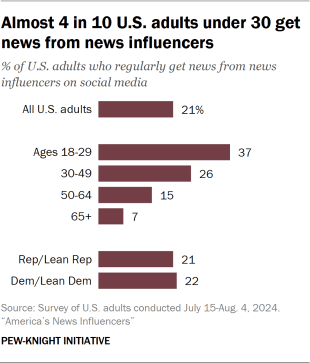
- About one-in-five U.S. adults (21%) say they regularly get news from news influencers on social media, according to a survey of 10,658 Americans conducted in summer 2024. This is especially common among younger adults: 37% of those ages 18 to 29 say they regularly get news from influencers. But there are minimal differences between Republicans and Democrats on this question.
- Among Americans who get news from news influencers on social media, most (65%) say news influencers have helped them better understand current events and civic issues. And seven-in-ten say the news they get from news influencers is at least somewhat different from the news they get from other sources. Far fewer (31%) say they feel a personal connection to a news influencer.
- These Americans also say they get a variety of different types of information, from basic facts and opinions to funny posts and breaking news. When it comes to opinions, most who see them say they are an even mix of opinions they agree and disagree with (61%), but far more say they mostly agree with what they see (30%) than mostly disagree (2%).
Jump to more findings from the survey of U.S. adults, or a broader analysis of Americans’ news habits on social media.
Most news influencers are on multiple sites, but X is the most common
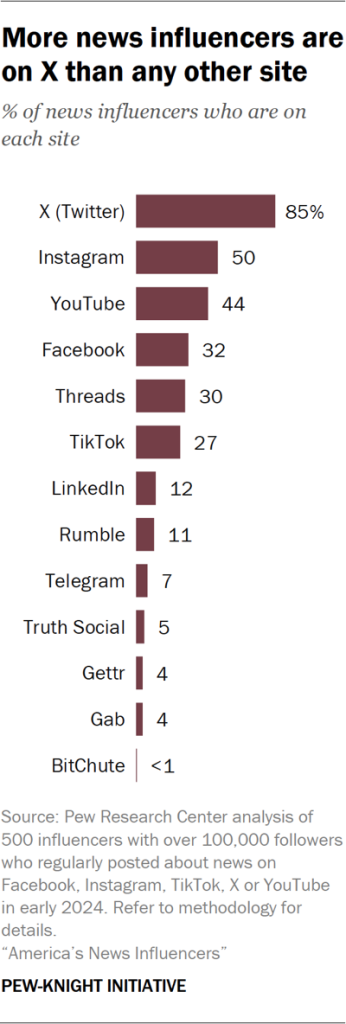
- Far more of the news influencers in our study have an account on X than any other social media site: 85% are on the site, compared with 50% who are on Instagram, the next-most popular site.
- At the same time, it is common for influencers to have a cross-site presence to maximize their audience. About two-thirds of news influencers in the study are on more than one site, including 27% who are on five or more sites.
- Many influencers also share content through podcasts (34%) or newsletters (22%). And across sites, a majority of news influencers (59%) monetize their online presence in some way, whether through subscriptions, donations or merchandise sales.
Jump to more basic details about where news influencers are posting.
News influencers are mostly men; more explicitly identify as right-leaning than left-leaning
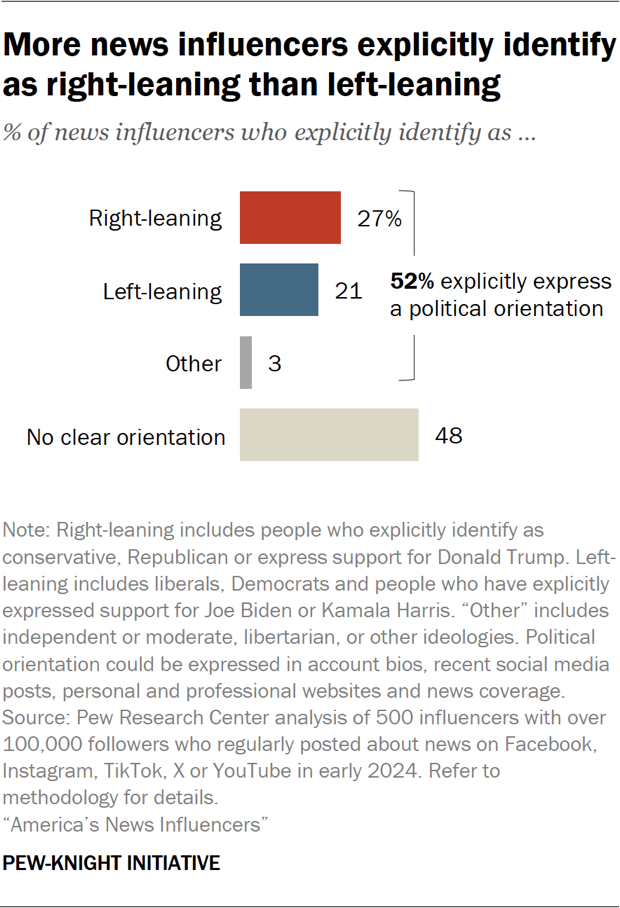
- Among the news influencers in our sample, men outnumber women by a roughly two-to-one margin: 63% of influencers are men, compared with 30% who are women. (The remainder either are nonbinary or their gender could not be determined by researchers.)
- Many Republicans have long believed that social media sites censor conservative viewpoints. But overall, more news influencers explicitly present a politically right-leaning orientation than a left-leaning one (27% vs. 21%) in their account bios, posts, websites or media coverage. About half of influencers do not express any clear political orientation. Influencers on Facebook are particularly likely to prominently express right-leaning views: There are three times as many explicitly conservative news influencers (39%) as liberal ones (13%) on the site.
- Nearly one-in-five news influencers (18%) share part of their identity or beliefs beyond their political orientation, such as expressing support for a specific political cause or value through words, images or emojis on their account page. Among the most common expressions are LGBTQ+ identity or support (6%) or being pro-Palestinian (5%).
Jump to more information on the personal characteristics of news influencers.
How news influencers on TikTok differ from those on other sites
While many news influencers are on multiple sites, there is also a different mix of influencers on each site. A closer look at five major social media sites, Facebook, Instagram, TikTok, X and YouTube, finds that news influencers on TikTok – a fast-growing destination for news in the U.S. – stand out from those on other sites in the following ways:
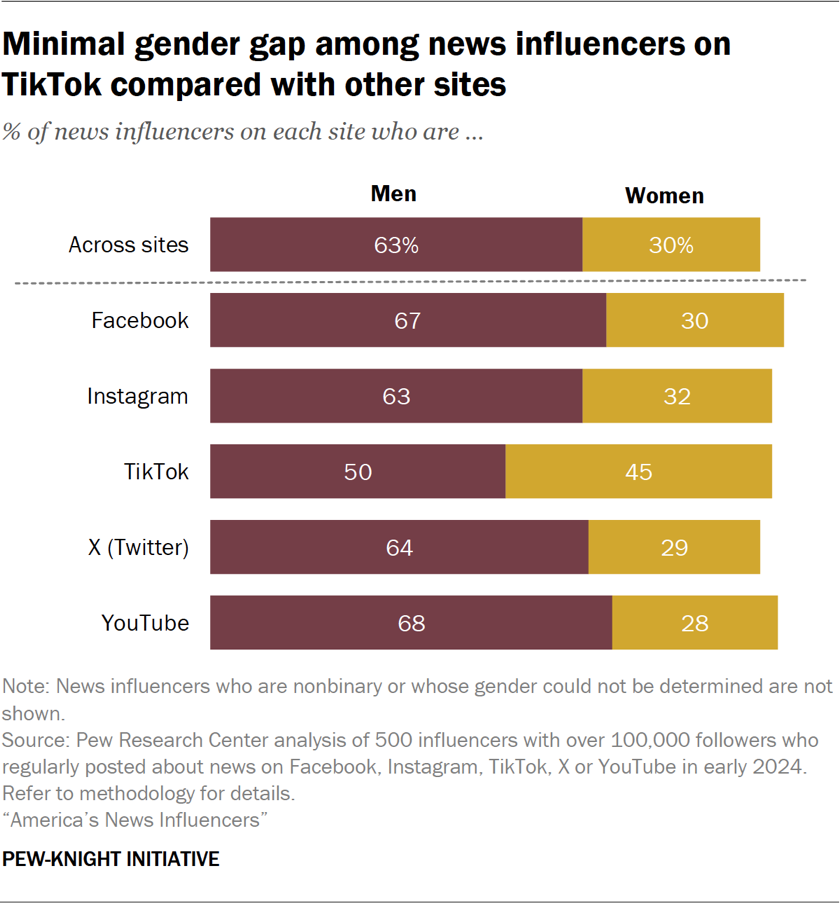
- Gender: TikTok has the smallest gender gap: 50% of news influencers on TikTok are men, while 45% are women. On all other sites, men outnumber women by a roughly two-to-one margin or more.
- Political 0rientation: TikTok also stands out as the only site of the five where news influencers who explicitly identify as right-leaning (25% of TikTok news influencers) do not outnumber those who publicly express a left-leaning political ideology (28%).
- Values and identities: News influencers on TikTok are more likely than those on other sites to show support for LGBTQ+ rights or identify as LGBTQ+ in their account profiles (13%).
How are news influencers who have worked for news organizations different from those who haven’t?
News influencers largely offer independent voices from outside the news media. About three-quarters of news influencers (77%) have no past or present affiliation with a news media organization, while 23% have been employed in the news industry in some way.
How we define ‘news organization affiliation’
Researchers categorized all news influencers based on whether they are currently or were previously employed by a news organization (or freelancers who regularly contributed to news organizations).
The list of news organizations that people in this category work for (or used to work for) is broad, ranging from long-standing newspapers to cable news channels to newer digital outlets. News organizations are defined as all outlets with a staff and multiple bylines. Researchers considered affiliated influencers to have this background regardless of their news organization’s political orientation, audience size or primary publishing method (digital, TV, print, etc.).
Those in the latter category include influencers who are currently affiliated with any news outlet (digital, TV, print, etc.), those who formerly worked in the news industry before becoming an independent influencer, and freelancers who have regularly contributed to news organizations.
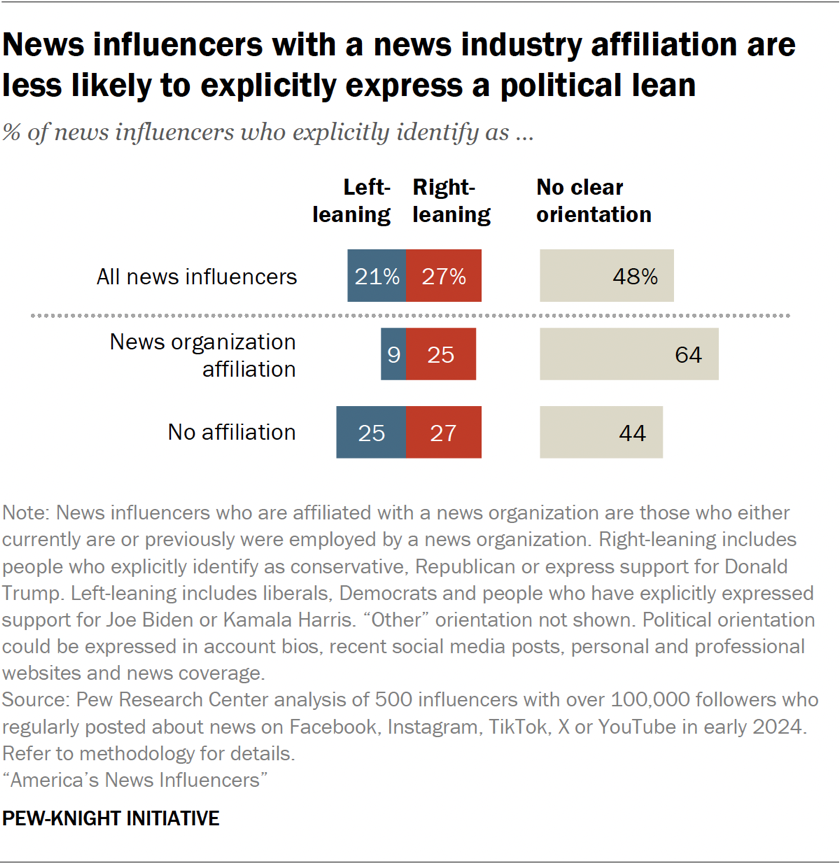
- News influencers with a news organization affiliation are less likely to express a clear political orientation: 64% have no expressed political stance, compared with 44% of those who have never worked for a news organization.
- When they do explicitly identify with a political orientation, news influencers with links to a news outlet tend to be right-leaning. A quarter (25%) say they are conservative, Republican or pro-Trump, while just 9% are liberal, Democratic, or pro-Harris or pro-Biden. Among news influencers with no links to a news outlet, roughly equal shares express a right-leaning (27%) and left-leaning (25%) stance.
- News influencers who are or were affiliated with a news organization also are less likely to identify with specific values and identities – for example, to indicate they are pro-LGBTQ+ or support Palestinians.
- Nearly all news influencers who have a news organization affiliation (96%) are on X, compared with a smaller majority of news influencers without that background (82%). In contrast, news influencers without a news industry affiliation are more likely than those with links to the news industry to have accounts on video-based sites like YouTube and TikTok, and also are more likely to monetize their content through subscriptions, donations or merchandise.
Jump to more details on how influencers differ based on whether they have a background in the news industry.
Politics and the election are by far the most common topic for news influencers in 2024
To get a sense of what news influencers are posting about, researchers collected all public posts by the 500 news influencers in our sample for three separate weeks in 2024: July 15-21, July 29-Aug. 4 and Aug. 19-25. We then analyzed these posts using a human-validated large language model.
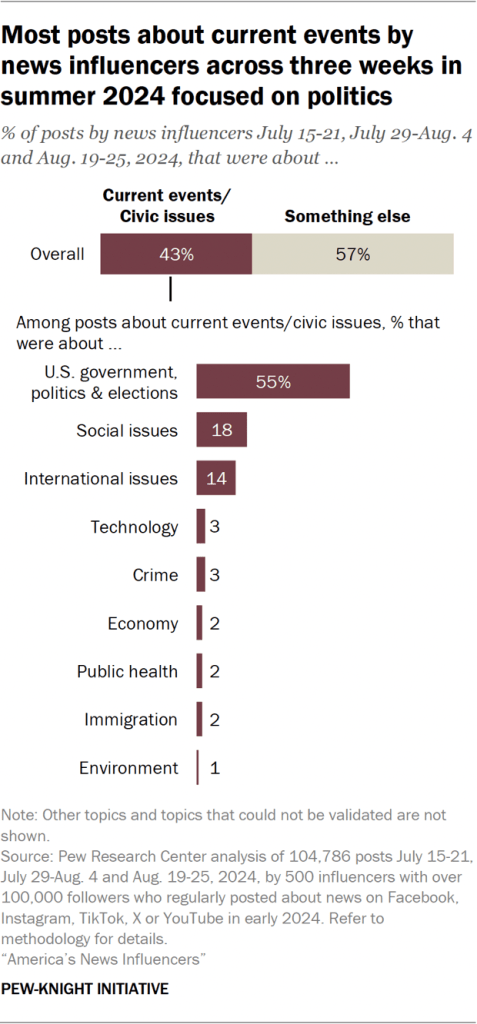
News influencers post about a wide range of topics. In fact, most of the posts by the news influencers in our sample during the three weeks (57%) could not be directly tied to current events or civic issues. (This may in part be a result of examining each post out of context, and not including images in the analysis.)
Some of the key findings from looking at the 43% of the posts that were confirmed to be about current events or civic issues:
- Among the posts that referenced current events or civic issues, more than half (55%) were about politics, government or the presidential election. This includes posts that were specifically about the first assassination attempt on Donald Trump (5%), the Democratic National Convention (4%), the Republican National Convention (3%) or President Joe Biden’s withdrawal from the race (2%). For most news influencers (58%), politics, government or the election was the most common post topic.
- Beyond U.S. politics in general, 18% of posts focused on social issues, including race, LGBTQ+ issues and abortion. A similar share of posts (14%) were about international issues, including the Israel-Hamas war (7%).
- The posts each week reflect the events going on at the time. Posts from July 15 to 21 were more likely than other weeks to be about the first assassination attempt on Trump on July 13 (10% of posts), the RNC, held from July 15 to 18 (6%), and Biden dropping out of the race on July 21 (5%). And posts from Aug. 19 to 25 were especially likely to be about the DNC, which was held that week (11%).
- Across all weeks, there was some variation across sites in which topics were discussed more or less often. For instance, the Israel-Hamas war was discussed more on Instagram than any other site (14% of Instagram posts, followed by 8% of X posts), while U.S. politics was a less common topic on Instagram than other sites. Politics and the election were discussed in a particularly high share of posts on YouTube (68%).
Jump to the full analysis of topics being discussed by news influencers.
Other Pew Research Center studies on social media
This study is the latest in our ongoing investigation into the news and information Americans are seeing on social media.
For our related research, read:
The rest of this report looks at these findings in greater detail. One section dives into the opinions and experiences of Americans who regularly get news from influencers. Others include a brief overview of how we created the list of news influencers and where they are posting content, an analysis of their gender and political orientation, and an overview of the differences between news influencers who have worked for news organizations and those who have not.
Finally, one section looks in more detail at the topics discussed by news influencers, and five additional sections profile news influencers on each of the major sites studied: Facebook, Instagram, TikTok, X (formerly Twitter) and YouTube.




